When you have trouble falling asleep naturally, a sleep aid can be a big help.
There are a lot of different herbal and pharmaceutical solutions to helping you fall asleep, and because of that, it can be difficult to figure out the right sleep aid for you.
Each option has advantages and disadvantages. Fortunately for you, our research team dug into the scientific literature to rank the best sleep aids on the market.
Research
Rankings
1. VitaBalance Nature Sleep
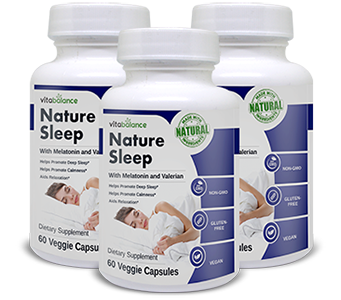
If you’re tired of tossing and turning all night every night, look no further than VitaBalance Nature Sleep.
More than a third of adults in the US don’t get enough sleep. Trouble is, lack of sleep (or poor sleep quality) does more than hurt your ability to be productive at work. It can cause anxiety, poor memory, heart and blood pressure problems, moodiness, and even weight gain. (Yes, some of those extra pounds could be the result of not getting a good night’s sleep on a regular basis!)
That’s why we love Nature Sleep. It’s a relaxing blend of melatonin, valerian, and chamomile — all known for their sleep-inducing properties — plus three lesser-known sleep aids: magnesium, goji berry, and lemon balm.
The result?
Your mind can actually relax, letting go of all the day’s stresses, easing you into a deep sleep, and keeping you there till morning.
So you can wake up refreshed, ready to hit the day running.
All natural. Gluten-free. Manufactured in an FDA-registered facility that follows GMP guidelines.
The all-around sleep aid winner of 2021.
Click here for the lowest price
2. Nuzena Circadian Sleep Support +
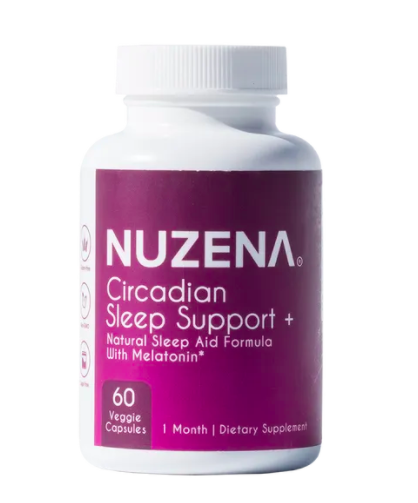
Click here for the lowest price
Nuzena is a brand-new supplement company known for their potent formulas.
Circadian Sleep Support + by Nuzena is shamelessly stacked and also one of the cheaper options on the list.
This formula includes several sleep ingredients that we like – with the likes of melatonin, magnesium, and valerian that are known to support the natural sleep cycle.
The formula also contains ingredients that are known to have natural calming effects such as 5-HTP, Lemon Balm, and L-Tryptophan — helping to reduce anxiety is one of their claims too.
All things considered, this formula definitely holds its own against other sleep aid supplements that we’ve reviewed.
3. Performance Lab Sleep
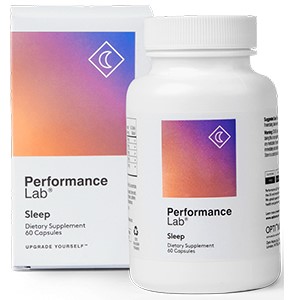
Click here for the lowest price
Performance Lab Sleep is a supplement designed to help you sleep better, and it includes an all-natural form of melatonin (Montmorency tart cherry), as opposed to the synthetic versions that many other brands use.
While directly supplementing melatonin is usually well tolerated by most healthy people, users do often report that it can leave them with a groggy feeling the next day. As a result, Performance Lab Sleep helps you sleep better and leaves you feeling fresher in the morning too.
Performance Lab Sleep also comes loaded with L-Trytophan and numerous forms of Magnesium – all tried-and-tested to improve your quality of sleep.
4. Luna
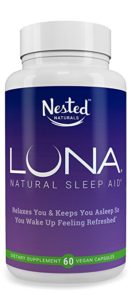
Luna combines several herbal and natural ingredients that have sleep-inducing properties. Its efficacy comes from the combined action of chamomile, valerian root, and a strong 6 mg dose of melatonin.
Without any questionable or ancillary ingredients, it’s a great buy.
5. Natures Wellness Natural Sleep Aid
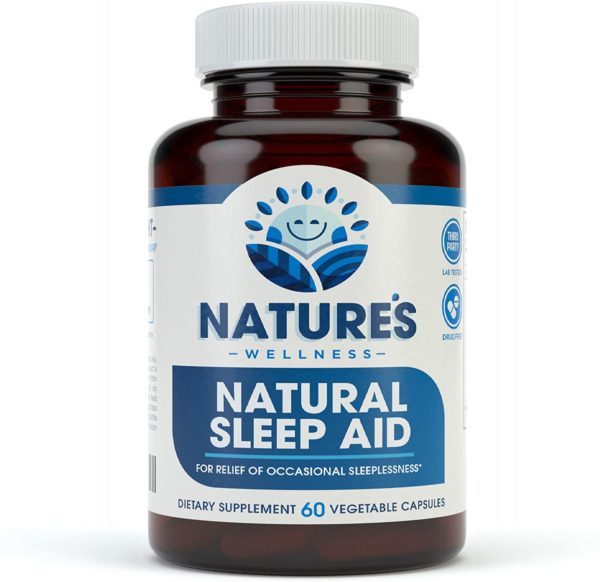
Natures Wellness Natural Sleep Aid is a robust blend of all the best herbal sleep extracts. It is best suited for people who have trouble falling asleep, staying asleep, or who don’t get restful sleep.
The valerian root, chamomile, and melatonin should work together to counter all three problems.
6. Zenwise Sleep Support
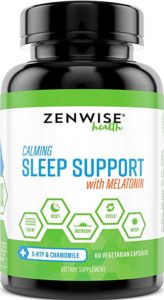
Zenwise has the usual ingredients you’d expect in a combined sleep aid, like theanine, chamomile, and melatonin, but it also includes the neurotransmitters GABA and 5-HTP.
The idea here is not to directly induce sleep with these ingredients, but rather ensure more restful sleep by giving your brain the ingredients it needs to recover while you’re asleep.
7. Sleep Sense
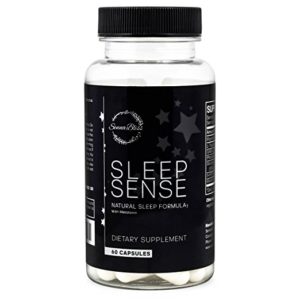
If you want a sleep aid that serves up a lot of neurotransmitters for brain recovery, Sleep Sense is your best bet. It has a moderate doses of melatonin, but a lot of 5-HTP, GABA, and the amino acid theanine.
8. Kirkland Sleep Aid
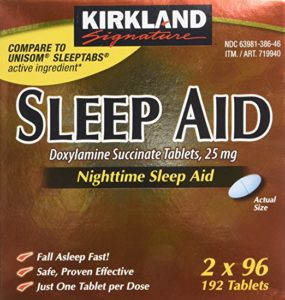
This sleep aid is easily available and popular, but because it’s antihistamine-based, you should only use it occasionally, and you should expect some next-day grogginess. It’s great for rehabbing from jet lag, though, or other short-term uses.
9. Zzzquil
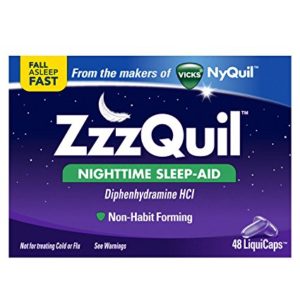
Zzzquil is essentially a version of Nyquil that’s geared specifically towards being a sleep aid instead of a night-time cold and flu medication.
It’s an antihistamine based sleep aid, meaning it is best used occasionally, not on a regular basis, and you should expect the possibility of next-day grogginess.
10. Nature Made Soft Gel Sleep
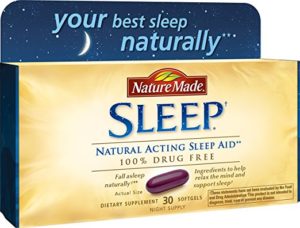
Nature made combines theanine, passionflower, melatonin, and chamomile in a widely-used sleep aid, but aside from the melatonin, the dosages of the other ingredients are probably too low to be effective.
11. Team 6 Star6urn PM
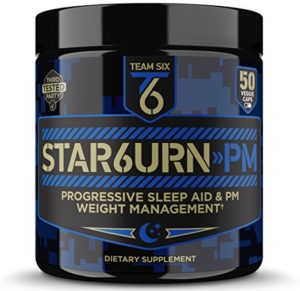
Team 6 has a unique combo supplement–a weight loss supplement and a sleep aid in one. The weight loss effects come from green coffee bean extract, garcinia cambogia, and a few other herbal ingredients, while the sleep-inducing effects come mostly from melatonin.
It’s a neat idea, but the stimulating effects of the fat burners might counter the effect of the melatonin.
Category winners
Best sleep aid overall: VitaBalance Nature Sleep
VitaBalance uses a well-chosen blend of natural compounds like tryptophan, chamomile, St. John’s Wort, and GABA to soothe your body and mind in the evening. It’s great both for falling asleep and staying asleep.
Best sleep aid for insomnia: Nested Naturals Luna
Can’t fall asleep? Luna is the way to go. Its potent 6 mg dose of melatonin can speed the onset of sleep, helping you avoid lying awake checking the clock.
Best sleep aid for tossing and turning: Nuzena Circadian Sleep Support +
Nuzena uses natural extracts like valerian and goji berry, plus neurotransmitters like melatonin and 5-HTP to help ensure you stay asleep once you fall asleep. For these reasons, it’s our choice for fighting sleepless nights.
Best sleep aid without antihistamines: VitaBalance Nature Sleep
Antihistamines like Benadryl can be potent sleep aids, but they also leave you feeling groggy the next day. Try VitaBalance Nature Sleep instead—it uses all-natural ingredients for easier, more restful sleep without using antihistamines.
Best sleep aid with natural melatonin: Performance Lab Sleep
Want a good night’s sleep, but not using chemicals synthesized in a lab? Performance Lab is the way to go. It uses magnesium, tryptophan, and Montmorency cherry extract (a source of naturally-occurring melatonin) to ease you to sleep.
Best sleep aid for restless legs: Nuzena Circadian Sleep Support +
In addition to the usual compounds for improving sleep quality, Nuzena includes magnesium in its sleep aid to help control restless leg syndrome, which is often associated with magnesium deficiencies.
Who should buy a sleep aid?
Many people don’t get enough sleep, but for some of them, it’s not just a matter of choice: sleep problems like insomnia, restless tossing and turning, or early awakening trouble a lot of people. Sleep aids can help with these problems.
A sleep aid uses supplemental or herbal compounds to help induce the onset of sleep and ensure that you stay asleep once you fall asleep. Sleep aids are most popular among people who have chronic sleep disturbances, particularly insomnia.
The incidence of these problems increases as you get older, so sleep aids are particularly popular (and particularly effective) among older adults. Insomnia is a common feature of menopause, which is another reason why sleep aids are popular among older adults.
Sleep aids are the topic of a lot of research into inexpensive treatments for insomnia, and also as a way to increase overall sleep quality.
Sleep aids have also proven very useful for short-term disturbances to sleep, like jet lag or changes in shift work. Since these abrupt changes in your schedule throw your body’s circadian rhythm off of its natural cycle, sleep aids that incorporate compounds modulating your circadian rhythm, like melatonin, are great for adjusting your body’s internal clock back to a new equilibrium.
Thanks to their short-term uses, sleep aids are popular among travellers and shift workers, even if they don’t have sleep problems as a part of their usual routines when they aren’t traveling or taking on atypical work hours.
Sleep aids aren’t a panacea, though—if you have trouble falling asleep or staying asleep, it’s important to make sure you don’t have any underlying medical conditions that are causing your sleep to be disturbed.
Sometimes insomnia can be caused by thyroid conditions, obstructive sleep apnea, or other potential problems. If a sleep aid doesn’t fix your sleep problems, it’s worth talking to your doctor about whether another potential reason could be explaining why it’s so hard for you to get a good night’s sleep.
How we ranked
When making our rankings of the best sleep aids on the market, we looked for supplements that offered a combination of ingredients that would both help you fall asleep and stay asleep, but without feeling groggy in the morning.
Based on a review of the scientific literature on supplements for sleep, we came up with a list of ingredients that have good evidence supporting their use in a sleep supplement. This list included melatonin, GABA, 5-HTP, chamomile, and valerian root, among others. Supplements that didn’t have any ingredients that were on this list were eliminated.
Next up, we looked at dosage: since all of these ingredients have been studied separately, there is at least some scientific data on the range of possible doses that are effective.
We eliminated supplements that used doses that were too low or too high, and we rewarded supplements that used doses close to the optimal dose determined by research, when available. For melatonin, for example, the optimal dose range seems to be between 0.5 and 5 mg. Doses on the high end induce sleep more quickly, but don’t make any difference in terms of staying asleep once you’ve fallen asleep.
Sleep aids based on antihistamines posed a special challenge: they tend to leave you groggy and listless the next day, but some people have success using them as sleep aids.
We made sure to include at least one good sleep aid based on an antihistamine, but ranked it lower than most others because of the potential undesirable side effects.
After looking at the primary ingredients, we looked to see which supplements included anything else that was potentially beneficial, such as magnesium, or an extended release formulation—these products are good for people who have trouble staying asleep through the night.
We also noted if any remaining supplements were bloated with extra ingredients that weren’t going to contribute to a good night’s sleep, and eliminated them. We also reduced the score of sleep aids that were bloated with unnecessary binders and fillers.
We were left with our final rankings of the best sleep aids available on the market right now. These should be your go-to options if you want a supplement to increase the quality and duration of your sleep.
Benefits
Sleep disturbances come in many forms. An inability to fall asleep, an inability to stay asleep, or a lack of restful and restorative sleep. Regardless of the sleep disturbance you have, there may be a sleep aid that can help.
There are several different options for supplemental treatment of poor sleep. These include valerian root, melatonin, chamomile, and antihistamine-based sleep aids.
Each of these has benefits and drawbacks, and there is a wide range of variation in the amount of scientific research that supports these various sleep aids.
The most popular and perhaps most useful sleep aid is melatonin. It is a naturally produced hormone that your body uses to set the timing of its internal clock.
In a healthy person with no sleep disturbances, melatonin levels start to rise when the sun goes down, and they induce sleepiness. Melatonin also seems to play a role in keeping you asleep and ensuring that you get restful and restorative sleep.
According to a 1994 scientific case series by J.E. Jan, H. Espezel, and R.E. Appleton, melatonin is an effective sleep aid when it comes to speeding up the onset of sleep and increasing the quality of sleep during the night (1).
They report on a series of patients at their office who had severe and chronic sleep disturbances. Some weren’t falling asleep immediately, while others would wake up restlessly throughout the night.
Jan, Espezel, and Appleton report that melatonin, delivered in a dose of 2 to 10 mg prior to going to bed, had a marked effect on all of the patients. Many recovered completely.
Other research published in the prestigious medical journal The Lancet demonstrated that melatonin is effective and improving sleep quality in elderly patients (2).
Even among older people who are totally healthy, the average quality of sleep is lower than in young people. As such, the researchers wanted to examine whether modulating melatonin levels would affect sleep quality.
Their study used a randomized and placebo-controlled design, meaning that the participants were split into two groups and randomly assigned either a melatonin supplement or a placebo to act as a control.
The researchers found that the melatonin supplement significantly increased sleep quality: disturbances in sleep decreased in the group taking the melatonin supplement, though total sleep time didn’t change.
This is actually good news because it means that you’re not going to sleep in very late if you take melatonin. You’ll fall asleep earlier, you’ll get higher quality sleep, and you’ll sleep for the same amount of time.
Melatonin has a specific, specialized action — inducing sleepiness by changing the body’s internal clock settings — but if that isn’t the cause of your problems, it might not help you. Valerian root has the potential to be a more robust way to treat sleep disturbances in resistant cases.
Another sleep aid worth looking into is valerian root. This herbal extract has long been reputed to have a beneficial effect on sleep quality, but studies into its biological effects on the body weren’t published until the 1980s.
One widely-cited article published in the journal Pharmacology Biochemistry and Behavior found that an aqueous solution derived from the valerian root increased sleep quality, as assessed by a subjective survey (3).
The study was well-randomized and controlled; the subjects served as their own controls and took either a valerian root extract or a control on random nights throughout the study’s duration.
Even though the survey on sleep quality was subjective, the subjects didn’t know which night they were taking a control or taking a placebo, and the results between each condition were different enough to be detected in the survey results.
Valerian root’s efficacy was bolstered by a large, well-controlled study in 2000 by researchers at Humboldt University of Berlin in Germany (4).
They found that valerian root had a substantial impact on sleep quality. Importantly this study looked at both the subjects’ subjective feelings about their sleep and objective measurements of sleep quality as recorded in a sleep lab.
The valerian root extract performed very well when it came to increasing sleep quality and decreasing sleep disturbances, and the incidence of side effects was low (in fact, there were fewer side effects in the valerian root extract group than in the placebo group).
The actual mechanism of action for valerian root is still unclear, but it appears to have an effect on a neurotransmitter called GABA which modulates a great number of psychological functions in the brain, including sleep.
Because of this proposed mechanism of action, valerian root should be considered as a more powerful second-line treatment for sleep disturbances.
The most famous herbal remedy for sleep might be chamomile. The plant has a long history of being used to induce sleep, and even now it’s the key ingredient in any “sleepytime” tea you buy at the grocery store.
Initial scientific evidence for the sleep-inducing effects of chamomile came from rats. Researchers at Okayama University in Japan found that chamomile extract had sleep-modulating effects similar to more powerful pharmaceutical sleep aids (5).
When it comes to humans, more insight comes from a review published in 2010 in the journal Molecular Medicine Reports.
The authors cite a number of studies on the basic biology of chamomile that offer circumstantial evidence that it may aid in inducing a deep and restful sleep.
Notably, chamomile does not have the kind of randomized, clinical trials that valerian root and melatonin have. This doesn’t necessarily mean it’s ineffective; it just means its efficacy has not been quantified yet. Still, the initial evidence is promising.
One final category of sleep aids is antihistamine drugs. These are essentially anti-allergy drugs that capitalize on one of the major side effects of these medications — drowsiness.
The same effect that drove pharmaceutical companies to investigate non-drowsy anti-allergy medication also inspired them to reexamine these drugs as vehicles for improving sleep quality.
These antihistamine sleep aids are best used occasionally, not on a regular basis, because you tend to develop a tolerance to their effects (6).
A sleep aid with magnesium may improve the quality of sleep, especially for older adults. While it’s not a blockbuster ingredient in sleep aids, magnesium is thought to play a role in the biochemistry that governs sleep. Research published in the journal Magnesium Research in 2010 demonstrated the effectiveness of using magnesium to improve sleep quality in older adults (7).
The study involved 100 adults aged 51 and older, all of whom had poor sleep quality according to a standardized sleep questionnaire. The researchers randomly assigned the people in the study to take either a placebo pill or a magnesium supplement on a daily basis for the next seven weeks, after which the researchers reassesed their sleep quality using the same questionnaire.
The results showed that the magnesium supplement group experienced significant increases in sleep quality compared to the placebo group. This study makes a good case for including magnesium in sleep aids, particularly for older adults.
The study authors noted that many of the subjects in the study had inadequate magnesium intake, which is a common finding in both older men and older women.
It’s not clear whether low magnesium levels are the result of changes in magnesium absorption as you get older, or changes in dietary patterns, but either way, magnesium deficiency is quite prevalent among older adults.
In older men, low magnesium intakes have also been connected to low testosterone, so there may be additional benefits of including magnesium in a sleep aid (as many of our top rated sleep aids do). Magnesium in combination with melatonin, for example, would be a wise combo for older adults.
Side effects
Each the sleep aids discussed above have different side effect profiles, which affects who might want to use them, and in what circumstances.
The side effect profile of melatonin is quite good for most people. There do seem to be some negative side effects in people who have neurological or serious medical conditions, though.
One study notes an increased risk of delirium in elderly patients who were taking melatonin, though it’s worth noting that these were patients who had already been admitted to the hospital for a serious medical condition (8).
Other research discourages using melatonin in children who have neurological disorders (9). However, studies on melatonin in healthy people have not reported any significant side effects, so if you are healthy, melatonin appears to be quite safe. If you have a serious medical condition, you should talk to your doctor first.
Valerian root appears to be more powerful because it affects basic brain chemistry at a more fundamental level. It does have a few reports of serious side effects: one case study described a patient who had serious heart problems and delirium after he stopped using a valerian root supplement (10).
Another study found that valerian root may interact with medications to cause health problems much like grapefruit does (11).
The upside of this is that if you have any medical conditions or if you are taking medication, you should check with your doctor before taking valerian root.
Chamomile appears to be quite safe, according to a scientific review on the supplement’s properties (12). The only documented side effect in a large trial was an allergic reaction to the plant material in a small number of people.
As more potent pharmaceuticals, antihistamines suffer from the problem of being too good at what they do. The main side effect is drowsiness the next day.
This has been documented both in subjective surveys and with objective medical scanning (13). You may adapt to this over time, but do expect there to be some lingering sleepiness the next day after you get up.
Recommended dosage
The appropriate dosage for a sleep aid depends on which one you are using.
Melatonin appears effective at doses ranging from 1-10 mg, while valerian root is typically prepared in the 200-600 mg range, though because there are fewer studies on it, its dosage characteristics are less well-documented.
Chamomile is even less studied, but the best and largest randomized trials have used dosages of 270 mg per day to treat insomnia. Antihistamines work best when used in doses of 25-50 mg.
FAQ
Q: What is the benefit of a sleep aid without antihistamines?
A: Antihistamines are one of the most widely available pharmaceutical compounds available for inducing sleep.
They’re pretty effective, as anyone who’s taken Benadryl for allergies knows—the sleepiness that results from taking an antihistamine is a well-known side effect, and actually motivated research into developing non-drowsy antihistamines.
The upside of using antihistamine based sleep aids, like Zzzquil, is that they tend to work pretty quickly.
The downside is that they can leave you feeling groggy the next morning. Antihistamines can also cause dry mouth, increased heart rate, and constipation.
Antihistamines are also generally not recommended for older adults either, which is a problem because sleep aids are quite popular among older adults: they need a different type of sleep aid than antihistamines.
Q: What is the most effective natural sleep aid?
A: The most well-studied most effective natural sleep aid is definitely melatonin. It’s all-natural, so much so that your own body synthesizes it to regulate your sleep wake cycle. Melatonin also occurs in both animals and in plants.
Melatonin is a good way to both fall asleep and stay asleep, without a big risk of feeling groggy and sluggish the next morning. More advanced sleep aid supplements combine melatonin with other effective ingredients like valerian root or 5-HTP, but even melatonin on its own is a good bet for improving the quality of your sleep.
Q: Is it OK to use Benadryl as a sleep aid?
A: Benadryl is commonly used as a sleep aid by people who don’t have anything else handy. Benadryl does work as a sleep aid because it is an antihistamine, which means that it induces drowsiness, albeit at the cost of additional side effects.
First off, Benadryl is not recommended as a sleep aid for people over age 60, because of its potent effects on the central and peripheral nervous system. Benadryl can also leave you groggy the next day, and has all the typical antihistamine side effects, like dry mouth.
It’s not a big deal for a healthy adult to use Benadryl as a one-off sleep aid if you’re jet lagged or sick, but it’s not good for frequent use. Try one of the better sleep aids in our rankings instead.
Q: What is a natural sleep pill?
A: A natural sleep pill is a supplement that uses naturally occurring compounds and herbal extracts like melatonin, magnesium, and valerian root, which help redirect your body’s circadian rhythm to help you fall asleep and stay asleep.
Natural sleeping pills can be contrasted with prescription-strength medications, like Ambien, which are more potent, for good and for bad. Natural sleep pills have a low risk of inducing dependence, and have a milder side effect profile compared to prescription sleep medication.
While natural sleep aids don’t fix underlying medical conditions, they can be a lower risk and efficacious way to improve sleep quality.
Q: What natural sleep remedies work for the elderly?
A: Older adults should opt for well-studied treatments for improving sleep quality. Two that stand out are magnesium and melatonin, since both of these have been demonstrated to have a beneficial effect in older adults.
Many older adults are deficient in magnesium, and while the exact biochemical mechanism is not known, magnesium appears to play a role in sleep regulation. Sleep remedies that use magnesium can be an effective way to improve sleep quality in the elderly, according to one study (14).
Melatonin is also well-studied and effective at helping older adults fall asleep and stay asleep (15), and is much safer for older adults than antihistamine-based sleep aids.
Q: What is a sleep aid?
A: A sleep aid is a supplement that uses compounds that adjust or modulate your body’s sleep-wake cycle, typically by adjusting your circadian rhythm.
The classic example that illustrates this mechanism is melatonin, a naturally occurring compound that your body typically excretes in the evening to make you sleepy.
People who have a disrupted sleep-wake cycle, like people who are jet lagged or who do irregular shift work, don’t get the natural bump in melatonin in the evening that they are supposed to. Taking a sleep aid that contains melatonin induces the surge in this hormone, which makes you sleepy and helps you fall (and stay) asleep.
Q: What is the safest sleep aid?
A: In terms of safety, In terms of safety, it’s hard to beat melatonin. It’s very well-researched, and its side effect profile is mild and well-characterized. It is not likely to leave you groggy or confused, and doesn’t induce dependence either (16).
Other compounds like Valerian or 5-HTP are newer, so they have not been studied with the same scrutiny as melatonin. This doesn’t mean they’re definitely less safe, just that their potential side effects are not as well understood.
Q: How do you use melatonin as a sleep aid?
A: Melatonin is easy to use: just take between 0.5 and 5 mg within an hour of when you plan on going to bed. After about thirty minutes, you should be ready for bed.
Higher doses, closer to the 5 mg end of the best effective dosage range, do seem to induce sleep more rapidly, but in terms of helping you stay asleep and in terms of the quality of your sleep during the night, there is no difference between 0.5 and 5 mg doses, so you have a lot of leeway in terms of what dosage you want to take.
This is also nice because you can opt for sleep aid supplements with other ingredients, as long as they have melatonin somewhere in this dosage range.
Related articles
Recap
When it comes to treating sleep disturbances with supplements, you have a lot of options.
For most people, melatonin is the best place to start, given its highly specific mode of action and its relatively safe side effect profile.
But if your circadian rhythm isn’t the source of your problems, valerian root, chamomile, or antihistamines (or some combination) could be a better solution.
Just be sure you know the side effect profiles of each, and choose the one or the combination that offers the best chance of solving your sleep problems.
For BodyNutrition’s #1 sleep aid recommendation, click here.